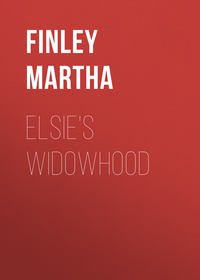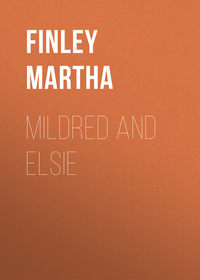 полная версия
полная версияElsie in the South
"Ortiz' mind, as they hurried him onward, was filled with the most horrible forebodings. When they reached the village the chief was waiting in the public square to receive them. One of the Spaniards was at once seized, stripped of his clothes and bade to run for his life.
"The square was enclosed by palisades and the only gateway was guarded by well-armed Indians. As soon as the naked Spaniard began to run one of the Indians shot an arrow, the barbed edge of which sank deeply into his shoulder. Another and another arrow followed, the man in a frenzy of pain hurrying round and round in a desperate effort to find some opening by which he might escape; the Indians looking on with evident delight.
"This scene lasted for more than an hour, and when the wretched victim fell to the ground there were no less than thirty arrows fixed in his flesh, and the whole surface of his body was covered with blood.
"The Indians let him lie there in a dying condition and chose another victim to go through the same tortures; then another and another till all were slain except Ortiz. By that time the Indians seemed to be tired of the cruel sport and he saw them consulting together, the chief apparently giving the others some directions.
"It seems that from some real or fancied resemblance Ucita saw in the lad to the cruel wretch, Pamphilo de Narvaez, he supposed him to be a relative; and therefore intended him to suffer some even more agonizing death than than just meted out to his fellows. For that purpose some of them now busied themselves in making a wooden frame. They laid parallel to each other two stout pieces of wood – six or seven feet long and three feet apart, then laid a number of others across them so as to form a sort of grate or hurdle to which they then bound Ortiz with leathern thongs. They then placed it on four stakes driven into the ground, and kindled a fire underneath, using for it such things as would burn slowly, scarcely making a blaze!
"Oh, mamma! were they going to burn him to death?" exclaimed Elsie, aghast with horror.
"Yes," replied her mother; "and he was soon suffering terribly. But one of the Indian women who was present felt sorry for him and hastened away to the house of Ucita and told his daughter Ulelah what was going on. She was a girl of eighteen and not so hard as the men. She was sorry for the poor young man and made haste to run to the scene of his sufferings, where he was shrieking with pain and begging for mercy.
"Hearing those sounds before she reached the spot she ran faster and got there panting for breath. At once she threw herself at her father's feet and begged him to stop the execution for a few minutes. He did so, ordering some of his men to lift the frame to which Ortiz was fastened, and lay it on the ground. Ulelah then begged her father to remember that Ortiz had never offended him, and that it would be more humane – more to his honor – to keep him as a prisoner, than to put him to death without any reason or justification.
"The chief sternly replied that he had sentenced the Spaniard to death and no consideration should prevent him from executing him. Then Ulelah begged him to put it off for a day that was annually celebrated as a religious festival, at which time he might be offered as a sacrifice to their gods.
"To that at length Ucita consented. Ortiz was unbound and the princess placed him under the care of the best physician of their tribe.
"As soon as Ortiz began to recover every care was taken that he should not escape. He was made to busy himself in the most laborious and slavish occupations. Sometimes he was compelled to run incessantly, from the rising of the sun to its setting, in the public square where his comrades had been put to death, Indians armed with bows and arrows standing ready to shoot him if he should halt for a moment. That over, he would lie exhausted, and almost insensible, on the hard earthen floor of a hut, the best lodging the chief would allow him.
"At such times Ulelah and her maids would come to him with food, restoratives, medicines, and words of consolation and encouragement, all of which helped him to live and endure.
"When Ortiz had been there about nine months the Princess Ulelah came to him one evening and told him that their religious festival would be celebrated on the first day of the new moon. Ortiz had heard that the chief intended to sacrifice him on that occasion and of course he was sorely distressed at the dreadful prospect before him, and as the time drew near he tried to prepare his mind for his doom, for he could see no way of escape. Ulelah told him she had done all she could to induce her father to spare his life, but could gain nothing more than a promise to delay the execution of the sentence for a year – on one condition, that he should keep guard over the cemetery of the tribe, where, according to the custom of their people, the bodies of the dead were exposed above ground until the flesh wasted away, leaving only the naked skeletons.
"The cemetery was about three miles from the village, in an open space of ground surrounded by forests. The bodies lay on biers on stages raised several feet above the ground, and it was necessary to keep a watch over them every night to protect them from the wild beasts of prey in the surrounding woods. Generally those who were compelled to keep this watch were criminals under sentence of death, who were permitted to live, if they could, so long as they performed that duty faithfully. But they ran great risks from the wild beasts of prey in the surrounding forests and from effluvia arising from the decaying bodies.
"It seemed a terrible alternative, but Ortiz took it rather than suffer immediate death. Ulelah wept over him, and her sympathy abated something of the horror of his hard fate and helped him to meet it manfully.
"Next day he was taken to the place by the chief's officers, who gave him a bow and arrows and other weapons, told him to be vigilant, and warned him against any attempt to escape.
"His little hut of reeds was in the midst of the cemetery. The stench was horrible and for several hours overpowered him with sickness and stupor such as he had never known before. But from that he partially recovered before night, and toward morning the howling of wolves helped to arouse him; yet presently he nearly lost consciousness again.
"In the early part of the night he had contrived to scare away the wolves by waring a lighted torch which was kept ready for the purpose. But at length he became conscious that some living thing was near him, as he could hear the sound of breathing; then by the light of his torch he saw a large animal dragging away the body of a child.
"Before he could arouse himself sufficiently to attack the animal it had reached the woods and was out of sight. He was very ill, but roused all his energies, fitted an arrow to his bow and staggered toward that part of the forest where the beast had disappeared. As he reached the edge of the wood he heard a sound like the gnawing of a bone. He could not see the creature that made it, but sent an arrow in the direction of the sound, and at the same moment he fell to the ground in a faint; for the exertion had entirely exhausted his small portion of strength.
"There he lay till daybreak, then recovering consciousness, he by great and determined effort managed to crawl back to his hut.
"Sometime later came the officers whose duty it was to make a daily examination. They at once missed the child's body and were about to dash out the brains of Ortiz, but he made haste to tell of his night adventure; they went to the part of the forest which he pointed out as the spot where he had fired at the wild animal; found the body of the child, and lying near it, that of a large dead animal of the tiger kind. The arrow of Ortiz had struck it between the shoulders, penetrated to the heart, and doubtless killed it instantly.
"The Indians greatly admired the skill Ortiz had shown by that shot, and as they recovered the body of the child they held him blameless.
"Gradually he grew accustomed to that tainted air and strong enough to drive away the wolves, killing several of them. The Indian officers brought him provisions, and so he lived for about two weeks. Then one night he was alarmed by the sound of footsteps which seemed those of human beings. He thought some new trouble was coming upon him, but as they drew near he saw by the light of his torch that they were three women – the Princess Ulelah and two female attendants. He recognized the princess by her graceful form and the richness of her dress. She told him the priests of her tribe would not consent to any change of his sentence or delay in carrying it out. That Ucita had promised them he should be sacrificed at the approaching festival, and they were determined not to allow their deity to be defrauded of his victim. She said she had exposed herself to great risk by coming to warn him of his danger, for if the priests should learn that she had helped him to escape they would take her life – not even her father's authority could save her from them, – and to save his life she advised him to fly at once.
"He thought all this proved that she loved him, and told her he loved her; that in his own country he belonged to an ancient and honorable family and was heir to a large estate. He begged her to go with him and become his wife.
"When he had finished speaking she was silent for a few moments; then answered in a tone that seemed to show some displeasure. 'I regret,' she said, 'that any part of my conduct should have led you into so great an error. In all my efforts to serve you I have had no motives but those of humanity; and I would have done no less for any other human being in the same circumstances. To fully convince you of your mistake I will tell you that I am betrothed to a neighboring cacique, to whose protection I am about to recommend you. Before daybreak I will send a faithful guide to conduct you to the village. Lose no time on the way, and when you are presented to Mocoso, give him this girdle as a token that you come from me. He will then consider himself bound to defend you from all danger, at the hazard of his own life.'
"Ulelah and her maidens then left him and before morning came the promised guide, who conducted Ortiz through the trackless forest in a northerly direction, urging him to walk very fast, as he would certainly be pursued as soon as his absence was discovered.
"In telling his story afterward Ortiz said they travelled about eight leagues and reached Mocoso's village, at whose entrance the guide, fearing to be recognized by some one of Mocoso's subjects, left him to enter it alone.
"Some Indians were fishing in a stream near by. They saw Ortiz come out of the woods, and frightened by his outlandish appearance, snatched up their arms with the intention of attacking him. But when he showed the girdle which Ulelah had given him they understood that he was the bearer of a message to their chief, and one of them came forward to give the usual welcome, and then led him to the village, where his Spanish dress, which he still wore, attracted much attention, and he was ushered into the presence of Mocoso. He found that chief a youthful Indian of noble bearing, tall and graceful in person, and possessed of a handsome and intelligent face. Ortiz presented the girdle. Mocoso examined it attentively, and greatly to the surprise of Ortiz seemed to gain from it as much information as if its ornamental work had been in written words.
"Presently raising his eyes from the girdle Mocoso said, 'Christian, I am requested to protect you and it shall be done. You are safe in my village; but do not venture beyond it, or you may have the misfortune to be recaptured by your enemies.'
"From that time Mocoso treated Ortiz with the affection of a brother."
"Oh, how nice!" exclaimed little Elsie. "But when Ucita heard that Ortiz was gone, what did he do about it?"
"When he heard where he was he sent ambassadors to demand that he be given up. Mocoso refused. That caused a misunderstanding between the two chiefs and delayed the marriage of Ulelah and Mocoso for several years. At the end of three years the priests interposed and the wedding was allowed to take place, but the two chiefs did not become reconciled and held no communication with each other.
"For twelve years Ortiz was kept in safety by Mocoso, then De Soto and his men came and Ortiz, hearing of their arrival, wanted to join them and set out to do so in company with some of his Indian friends.
"At the same time a Spaniard named Porcalla had started out to hunt some Indians for slaves. On his way he saw Ortiz with his party of ten or twelve Indians, and with uplifted weapons he and his men spurred their horses toward them. All but one fled, but he drew near and, speaking in Spanish, said, 'Cavaliers, do not kill me. I am one of your own countrymen; and I beg you not to molest these Indians who are with me; for I am indebted to them for the preservation of my life.'
"He then made signs for his Indian friends to come back, which some few did, and he and they were taken on horseback behind some of the cavaliers, and so conveyed to De Soto's camp where Ortiz told his story; the same that I have been telling you.
"'As soon as Mocoso heard of your arrival,' he went on, 'he asked me to come to you with the offer of his friendship, and I was on my way to your camp with several of his officers when I met your cavaliers.'
"While listening to this story De Soto's sympathies had been much excited for Ortiz. He at once presented him with a fine horse, a suit of handsome clothes, and all the arms and equipments of a captain of cavalry.
"Then he sent two Indians to Mocoso with a message, accepting his offers of friendship and inviting him to visit the camp; which he shortly afterward did, bringing with him some of his principal warriors. His appearance and manners were such as at once to prepossess the Spaniards in his favor. De Soto received him with cordiality and thanked him for his kindness to the Spaniard who had sought his protection.
"Mocoso's reply was one that could not fail to be pleasing to the Spaniards. It was that he had done nothing deserving of thanks; that Ortiz had come to him well recommended and his honor was pledged for his safety. 'His own valor and other good qualities,' he added, 'entitled him to all the respect which I and my people could show him. My acquaintance with him disposes me to be friendly to all his countrymen.'
"The historian goes on to tell us that when Mocoso's mother heard where he had gone she was terrified at the thought of what injury might be done to him – no doubt remembering the sad misfortune of Ucita and his mother, so cruelly dealt with by the treacherous Spaniards. In the greatest distress she hurried to the camp of De Soto and implored him to set her son at liberty and not treat him as Ucita had been treated by Pamphilo. 'If he has offended you,' she said, 'consider that he is but young and look upon his fault as one of the common indiscretions of youth. Let him go back to his people and I will remain here and undergo whatever sufferings you may choose to inflict.'"
"What a good kind mother!" exclaimed Elsie Raymond. "I hope they didn't hurt her or her son either."
"No," said her mother; "De Soto tried to convince her that he considered himself under obligations to Mocoso, and that he had only intended to treat him in a most friendly manner. But all he could say did not remove the anxiety of the poor frightened woman, for she had come to believe the whole Spanish nation treacherous and cruel. Mocoso himself at last persuaded her that he was entirely free to go or stay as he pleased. Still she could not altogether banish her fears, and before leaving she took Juan Ortiz aside and entreated him to watch over the safety of his friend, and especially to take heed that the other Spaniards did not poison him."
"Did Mocoso stay long? and did they harm him, mamma?" asked Elsie.
"He stayed eight days in the Spanish camp," replied Violet; "being inspired with perfect confidence in the Christians."
"Christians, mamma? What Christians?" asked Ned.
"That was what the Spaniards called themselves," she answered; "but it was a sad misnomer; for theirs was anything else than the spirit of Christ."
CHAPTER IV
The next evening the same company, with some additions, gathered in the library at Woodburn, all full of interest in the history of Florida and anxious to learn what they could of its climate, productions, and anything that might be known of the tribes of Indians inhabiting it before the invasion of the Spaniards.
At the earnest request of the others Grandma Elsie was the first narrator of the evening.
"I have been reading Wilmer's 'Travels and Adventures of De Soto,'" she said. "He tells much that is interesting in regard to the Indians inhabiting Florida when the Spaniards invaded it. One tribe was the Natchez, and he says that they and other tribes also had made some progress in civilization; but the effect of that invasion was a relapse into barbarism from which they have never recovered. At the time of De Soto's coming they had none of the nomadic habits for which the North American Indians have since been remarkable. They then lived in permanent habitations and cultivated the land, deriving their subsistence chiefly from it, though practising hunting and fishing, partly for subsistence and partly for sport. They were not entirely ignorant of arts and manufactures and some which they practised were extremely ingenious. They had domestic utensils and household furniture which were both artistic and elegant. Their dresses, especially those of the females, were very tasteful and ornate. Some specimens of their earthenware are still preserved and are highly creditable to their skill in that branch of industry. Among their household goods they had boxes made of split cane and other material, ingeniously wrought and ornamented; also mats for their floors. Their wearing apparel was composed partly of skins handsomely dressed and colored, and partly of a sort of woven cloth made of the fibrous bark of the mulberry tree and a certain species of wild hemp. Their finest fabrics, used by the wives and daughters of the caciques, were obtained from the bark of the young mulberry shoots beaten into small fibres, then bleached and twisted or spun into threads of a convenient size for weaving, which was done in a very simple manner by driving small stakes into the ground, stretching a warp across from one to another, then inserting the weft by using the fingers instead of a shuttle. By this tedious process they made very beautiful shawls and mantillas, with figured borders of most exquisite patterns."
"They must have been very industrious, I think," said Elsie.
"Yes," assented her grandmother. "The weavers I presume were women; but the men also seem to have been industrious, for they manufactured articles of gold, silver, and copper. None of iron, however. Some of their axes, hatchets, and weapons of war were made of copper, and they, like the Peruvians, possessed the art of imparting a temper to that metal which made it nearly equal to iron for the manufacture of edge tools. The Peruvians, it is said, used an alloy of copper and tin for such purposes; and that might perhaps be harder than brass, which is composed chiefly of copper and zinc."
"Had they good houses to live in, grandma?" asked Ned.
"Yes," she replied; "even those of the common people were much better than the log huts of our Western settlers, or the turf-built shanties of the Irish peasantry. Some were thirty feet square and contained several rooms each, and some had cellars in which the people stored their grain. The houses of the caciques were built on mounds or terraces, and sometimes had porticos, and the walls of some were hung with prepared buckskin which resembled tapestry, while others had carpets of the same material. Some of their temples had sculptured ornaments. A Portuguese gentleman tells of one on the roof or cupola of a temple which was a carved bird with gilded eyes.
"The religion of the Natchez resembled that of the Peruvians; they worshipped the sun as the source of light and heat, or a symbol of the divine goodness and wisdom. They believed in the immortality of the human soul and in future rewards and punishments; in the existence of a supreme and omnipotent Deity called the Great Spirit and also in an evil spirit of inferior power, who was supposed to govern the seasons and control the elements. They seem not to have been image-worshippers until the Spaniards made them such. Their government was despotic, but not tyrannical. They were ruled by their chiefs, whose authority was patriarchal, who were like popes or bishops, rather than princes, but who never abused their power."
Grandma Elsie paused as if she had finished her narration and Ned exclaimed, "Oh, that isn't all, grandma, is it?"
"All of my part of the account, for the present at least," she said with her sweet smile. Then turning to Lucilla:
"You will tell us the story of the Princess Xualla, will you not?"
"You could surely do it much better than I, Grandma Elsie," was the modest rejoinder; "but if you wish it I will do my best."
"We do," replied several voices, and Lucilla, encouraged by a look and smile from her father which seemed to speak confidence in her ability, at once began.
"It seems that De Soto, not finding there the gold for which he had come, and encouraged by the Indians, who wanted to be rid of him, to think that it might be discovered in regions still remote, started again upon his quest, taking a northerly or northwesterly direction.
"As they journeyed on they came to a part of Florida governed by a female cacique – a beautiful young girl called the Princess Xualla. Her country was a fine open one, well cultivated. They reached the neighborhood of her capital – a town on the farther side of a river – about an hour before nightfall. Here they encamped and were about to seize some Indians to get from them information of the country and people. But some others on the farther side of the stream hastened over in a canoe to ask what was wanted.
"De Soto had had a chair of state placed on the margin of the stream and placed himself in it. The Indians saluted him and asked whether he was for peace or for war. He replied that he wished to be at peace and hoped they would supply him with provisions for his army.
"They answered that they wished to be at peace, but the season had been one of scarcity and they had barely enough food for themselves. Their land, they said, was governed by a maiden lady and they would report to her of the arrival of the strangers and what they demanded.
"They then returned to their canoe and paddled back to the town to carry the news to the princess and chieftains. The Spaniards, watching the canoe, saw those in it received by a crowd of their countrymen at the landing place, and that their news seemed to cause some commotion. But soon several canoes left the wharf and came toward the Spaniards. The first was fitted up with a tasteful canopy and various decorations. It was filled with women all gayly dressed, among them the princess, the splendor of whose appearance almost dazzled the eyes of the beholders. There were five or six other canoes, which held her principal officers and attendants.
"When the boats reached the shore the Indians disembarked and placed a seat for their lady opposite to De Soto's chair of state. She saluted the strangers with grace and dignity, then, taking her seat, waited in silence as if expecting her visitors to begin the conference.
"For several minutes De Soto gazed upon her with feelings of admiration and reverence. He had seldom seen a more beautiful female, or one in whom the conscious pride of elevated rank was so nicely balanced with womanly reserve and youthful modesty. She seemed about nineteen years of age, had perfectly regular features and an intellectual countenance, a beautiful form, and she was richly dressed. Her robe and mantilla were of the finest woven cloth of native manufacture and as white and delicate of texture as the finest linen of Europe. Her garments were bordered with a rich brocade composed of feathers and beads of various colors interwoven with the material of the cloth. She wore also a profusion of pearls and some glittering ornaments which the Spaniards supposed to be of gold. Her name was Xualla and she ruled over several provinces.









